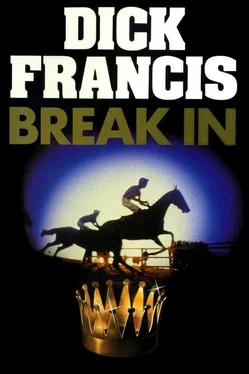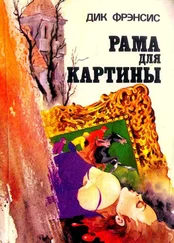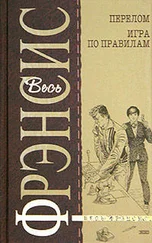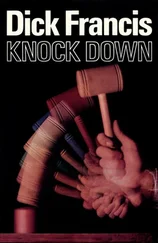North Face’s comment on the proceedings took the form of a lowered head and arched back, and a kick like a bronco. The other riders cursed and kept out of his way, and the starter told me to stay well to the rear.
It was the big race of the day, though heavier in prestige than prize money, an event in which the sponsors, a newspaper, were getting maximum television coverage for minimum outlay. The Sunday Towncrier Trophy occurred annually on a Saturday afternoon (naturally) for full coverage in the Sunday Towncrier itself the next morning, with self-congratulatory prose and dramatic pictures jostling scandals on the front page. Dramatic pictures of Fielding being bucked off before the start were definitely not going to be taken. I called the horse a bastard, a sod and a bloody pig, and in that gentlemanly fashion the race began.
He was mulish and reluctant and we got away slowly, trailing by ten lengths after the first few strides. It didn’t help that the start was in plain view of the stands instead of decently hidden in some far corner. He gave another two bronco kicks to entertain the multitude, and there weren’t actually many horses who could manage that while approaching the first fence at Cheltenham.
He scrambled over that fence, came almost to a halt on landing and bucked again before setting off, shying against coercion from the saddle both bodily and clearly in mind.
Two full circuits ahead. Nineteen more jumps. A gap between me and the other runners of embarrassing and lengthening proportions. I sent him furious messages: Race, you bastard, race, or you’ll end up as dogmeat, I’ll personally kill you, you bastard, and if you think you’ll get me off, think again, you’re taking me all the way, you sod, so get on with it, start racing, you sod, you bastard, you know you like it, so get going...
We’d been through it before, over and over, but he’d never been worse. He ignored all take-off signals at the second fence and made a mess of it and absolutely refused to gallop properly round the next bend.
Once in the past when he’d been in this mood I’d tried simply not fighting him but letting him sort out his own feelings, and he’d brought himself to a total halt within a few strides. Persevering was the only way: waiting until the demonic fit burned itself out.
He stuck his toes in as we approached the next fence as if the downhill slope there alarmed him, which I knew it didn’t; and over the next, the water jump, he landed with his head down by his feet and his back arched, a configuration almost guaranteed to send a jockey flying. I knew his tricks so well that I was ready for him and stayed in the saddle, and after that jolly little manoeuvre we were more than three hundred yards behind the other horses and seriously running out of time.
My feelings about him rose to somewhere near absolute fury. His sheer pigheadedness was again going to lose us a race we could easily have won, and as on other similar occasions I swore to myself that I’d never ride the brute again, never. Not ever. Never. I almost believed I meant it.
As if he’d been a naughty child who knew its tantrums had gone too far, he suddenly began to race. The bumpy uneven stride went smooth, the rage faded away, the marvellous surge of fighting spirit returned, as it always did in the end. But we were a furlong and a half to the rear, and to come from more than three hundred yards behind and still win meant theoretically that one could have won by the same margin if one had tried from the start. A whole mile had been wasted; two left for retrieval. Hopeless.
Never give up, they say.
Yard by flying yard over the second circuit we clawed back the gap, but we were still ten lengths behind the last tired and trailing horse in front as we turned towards the final two fences. Passed him over the first of them. No longer last, but that was hardly what mattered. Five horses in front, all still on their feet after the long contest, all intent on the final uphill battle.
All five went over the last fence in front of North Face. He must have gained twenty feet in the air. He landed and strode away with smooth athletic power as if sticky bronco jumps were the peccadillo of another horse altogether.
I could dimly hear the crowd roaring, which one usually couldn’t. North Face put his ears back and galloped with a flat, intense, bloody-minded stride, accelerating towards the place he knew was his, that he’d so wilfully rejected, that he wanted in his heart.
I flattened myself forward to the line of his neck to cut the wind resistance; kept the reins tight, my body still, my weight steady over his shoulders, all the urging a matter of mind and hands, a matter of giving that fantastic racing creature his maximum chance.
The others were tiring, the incline slowing them drastically, as it did always to so many. North Face swept past a bunch of them as they wavered and there was suddenly only one in front, one whose jockey thought he was surely winning and had half dropped his hands.
One could feel sorry for him, but he was a gift from heaven. North Face caught him at a rush a bare few strides from the winning post, and I heard his agonised cry as I passed.
Too close for comfort, I thought, pulling up. Reprieved on the scaffold.
There was nothing coming from the horse’s mind: just a general sort of haze that in a human one would have interpreted as smugness. Most good horses knew when they’d won: filled their lungs and raised their heads with pride. Some were definitely depressed when they lost. Guilt they never felt, nor shame nor regret nor compassion: North Face would dump me next time if he could.
The princess greeted us in the unsaddling enclosure with starry eyes and a flush on her cheeks. Stars for success, I diagnosed, and the flush from earlier embarrassment. I unbuckled the girths, slid the saddle over my arm and paused briefly before going to weigh in, my head near to hers.
‘Well done,’ she said.
I smiled slightly. ‘I expected curses.’
‘He was especially difficult.’
‘And brilliant.’
‘There’s a trophy.’
‘I’ll come right out,’ I said, and left her to the flocking newsmen, who liked her and treated her reverently, on the whole.
I passed the scales. The jockey I’d beaten at the last second was looking ashamed, but it was his own fault, as well he knew. The Stewards might fine him. His owners might sack him. No one else paid much attention either to his loss or to my win. The past was the past: the next race was what mattered.
I gave my helmet and saddle to the valet, changed into different colours, weighed out, put the princess’s colours back on, on top of those I would carry in the next race, combed my hair and went out dutifully for the speeches. It always seemed a shame to me when the presentation photographs were taken with the jockey not wearing the winner’s colours, and for owners I cared for I did whenever possible appear with the right set on top. It cost me nothing but a couple of minutes, and it was more satisfactory, I thought.
The racecourse (in the shape of the chairman of directors) thanked the Sunday Towncrier for its generosity and the Sunday Towncrier (in the shape of its proprietor, Lord Vaughnley) said it was a pleasure to support National Hunt racing and all who sailed in her.
Cameras clicked.
There was no sign anywhere of Holly.
The proprietor’s lady, thin, painted and good-natured, stepped forward in smooth couturier clothes to give a foot-high gilded statue of a towncrier (medieval version) to the princess, amid congratulation and hand shaking. The princess accepted also a smaller gilt version on behalf of Wykeham Harlow, and in my turn I received the smile, the handshake, the congratulations and the attentions of the cameras, but not, to my surprise, my third set of golden towncrier cufflinks.
Читать дальше




